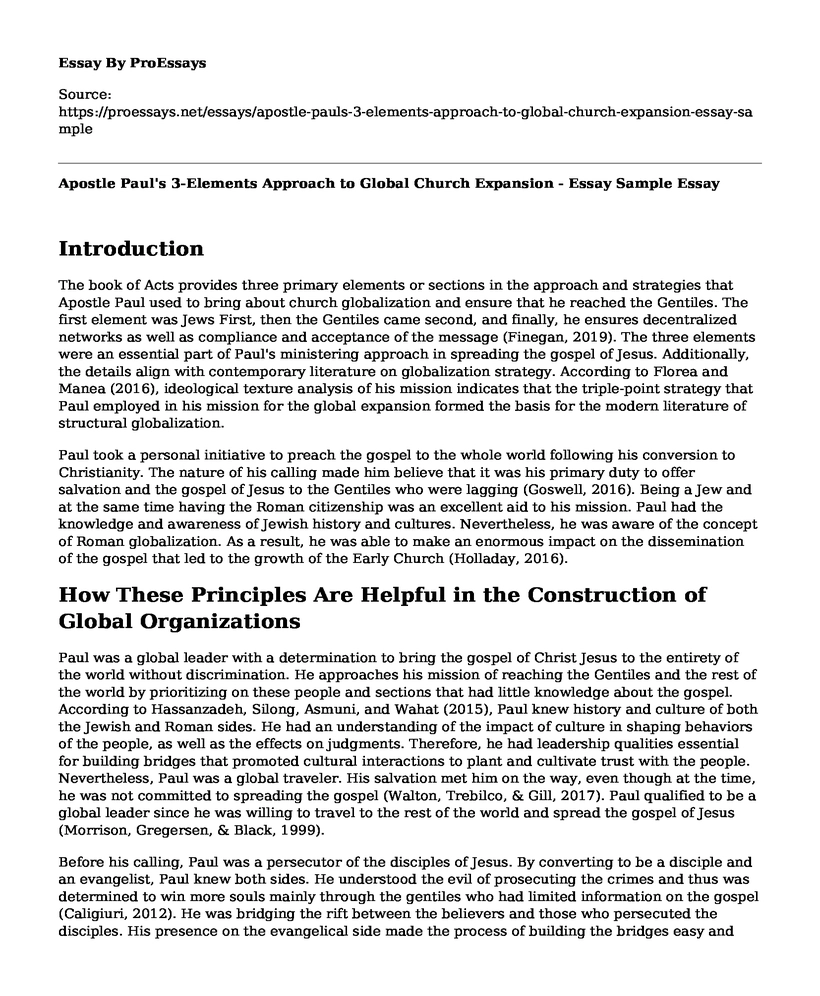Introduction
The book of Acts provides three primary elements or sections in the approach and strategies that Apostle Paul used to bring about church globalization and ensure that he reached the Gentiles. The first element was Jews First, then the Gentiles came second, and finally, he ensures decentralized networks as well as compliance and acceptance of the message (Finegan, 2019). The three elements were an essential part of Paul's ministering approach in spreading the gospel of Jesus. Additionally, the details align with contemporary literature on globalization strategy. According to Florea and Manea (2016), ideological texture analysis of his mission indicates that the triple-point strategy that Paul employed in his mission for the global expansion formed the basis for the modern literature of structural globalization.
Paul took a personal initiative to preach the gospel to the whole world following his conversion to Christianity. The nature of his calling made him believe that it was his primary duty to offer salvation and the gospel of Jesus to the Gentiles who were lagging (Goswell, 2016). Being a Jew and at the same time having the Roman citizenship was an excellent aid to his mission. Paul had the knowledge and awareness of Jewish history and cultures. Nevertheless, he was aware of the concept of Roman globalization. As a result, he was able to make an enormous impact on the dissemination of the gospel that led to the growth of the Early Church (Holladay, 2016).
How These Principles Are Helpful in the Construction of Global Organizations
Paul was a global leader with a determination to bring the gospel of Christ Jesus to the entirety of the world without discrimination. He approaches his mission of reaching the Gentiles and the rest of the world by prioritizing on these people and sections that had little knowledge about the gospel. According to Hassanzadeh, Silong, Asmuni, and Wahat (2015), Paul knew history and culture of both the Jewish and Roman sides. He had an understanding of the impact of culture in shaping behaviors of the people, as well as the effects on judgments. Therefore, he had leadership qualities essential for building bridges that promoted cultural interactions to plant and cultivate trust with the people. Nevertheless, Paul was a global traveler. His salvation met him on the way, even though at the time, he was not committed to spreading the gospel (Walton, Trebilco, & Gill, 2017). Paul qualified to be a global leader since he was willing to travel to the rest of the world and spread the gospel of Jesus (Morrison, Gregersen, & Black, 1999).
Before his calling, Paul was a persecutor of the disciples of Jesus. By converting to be a disciple and an evangelist, Paul knew both sides. He understood the evil of prosecuting the crimes and thus was determined to win more souls mainly through the gentiles who had limited information on the gospel (Caligiuri, 2012). He was bridging the rift between the believers and those who persecuted the disciples. His presence on the evangelical side made the process of building the bridges easy and fast. He also had cultural cohesion and communication skills are vital for global leadership (Cabrera & Unruh, 2012).
Paul made several trips to different parts of the world, including Athens, where he builds an understanding of the cultures and beliefs of the people. His ability to incorporate Christianity teaching to the Jewish customs and relate them to the cultures of Athenians ensured the smooth spreading of the gospel and transition from the idolatry worship to believing in the gospel of Christ. Paul directly confronted the idolatry form of worship terming these worship as "worship of unknown god" as opposed to the true living God (Acts 17:23). According to Kostenberger and O'Brien, (2017) condemning idol worship and drawing people's attention to the worship of the Living God is the first step in achieving global salvation.
References
Cabrera, A., & Unruh, G. (2012). Being global: How to think, act, and lead in a transformed world (Kindle ed.). Harvard Business Press.
Caligiuri, P. (2012). Cultural agility: Building a pipeline of successful global professionals (Kindle ed.). San Francisco, CA: Jossey-Bass.
Finegan, J. (2019). The Archaeology of the New Testament: The Mediterranean World of the Early Christian Apostles. Routledge.
Florea, N.V. & Manea, R.G. (2016). Leadership Communication-an efficient way to motivate human Capital. Management and Marketing 14(1), 101- 117.
Goswell, G. (2016). The Place of the Book of Acts in Reading the NT. Journal of the Evangelical Theological Society, 59(1), 67.
Hassanzadeh, M. Silong, A., Asmuni, A., & Wahat, N.W.A. (2015). Developing effective global leadership. Journal of Educational and Social Research 5(3), 15.
Holladay, C. R. (2016). Acts: A Commentary. Westminster John Knox Press.
Kostenberger, A. J., & O'Brien, P. T. (2017). Salvation to the Ends of the Earth. Salvation to the ends of the Earth.
Morrison, A., Gregersen, H., & Black, S. (1999). What makes savvy global leaders? Ivey Business Journal, 64(2), 44-51.
Walton, S., Trebilco, P., & Gill, D. W. (Eds.). (2017). The Urban World and the First Christians. Wm. B. Eerdmans Publishing.
Cite this page
Apostle Paul's 3-Elements Approach to Global Church Expansion - Essay Sample. (2023, Apr 08). Retrieved from https://proessays.net/essays/apostle-pauls-3-elements-approach-to-global-church-expansion-essay-sample
If you are the original author of this essay and no longer wish to have it published on the ProEssays website, please click below to request its removal:
- Some Questions on Religion. Essay Example.
- Marketing Research Champion for Christ Essay
- Essay Sample on Literary Relationships Between the Gospel of John and the Synoptic Gospels
- Essay Example on ISIS: Rising to Power & Impact on Islamic Religion
- 39 Books of Old & New Testament: Genesis to Mathew - Essay Sample
- Free Essay Example on Creation of Cosmos
- Status of Women in Hinduism - Essay Sample







